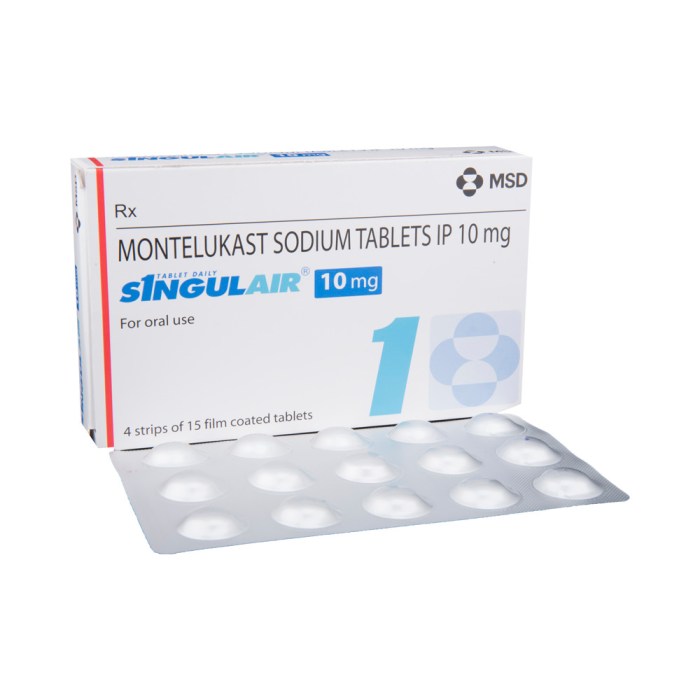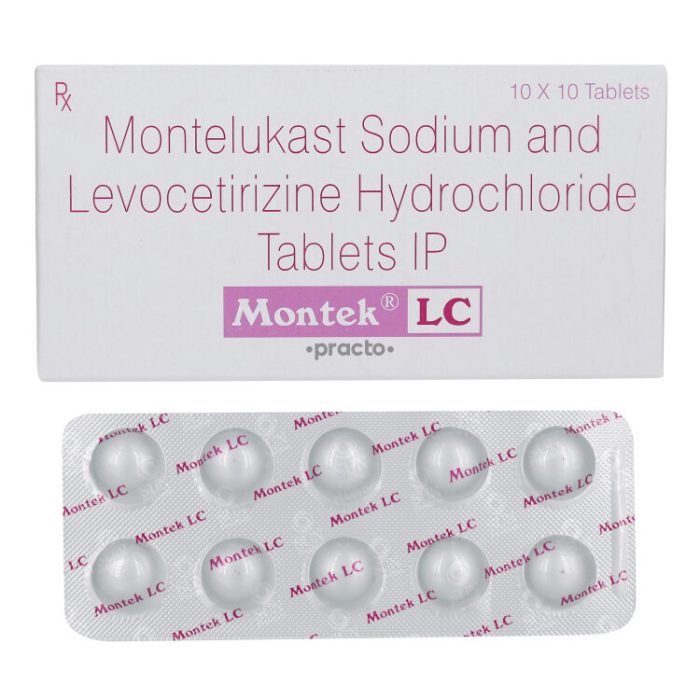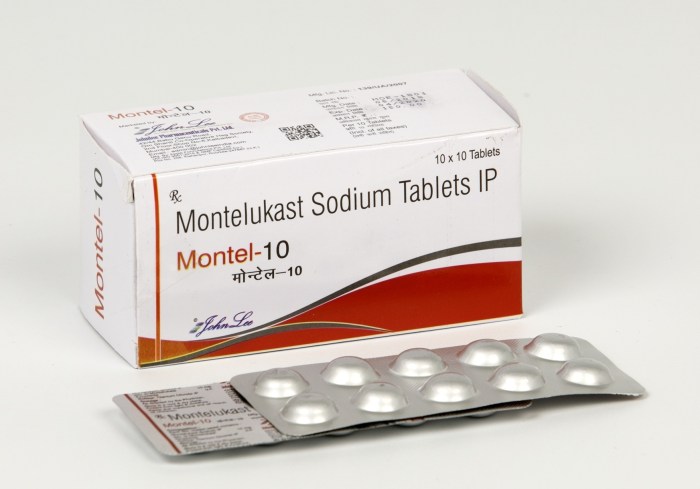Montelukast tablet uses extend beyond just treating asthma. This medication, a leukotriene receptor antagonist, effectively blocks the action of certain chemicals in the body that trigger inflammation and airway constriction, making it a valuable tool for managing various respiratory and allergic conditions.
From alleviating the symptoms of seasonal allergies to preventing asthma attacks, montelukast offers a range of benefits. Understanding its mechanism of action and potential side effects is crucial for patients seeking relief from these conditions. This guide delves into the comprehensive uses of montelukast tablets, providing insights into its effectiveness, potential interactions, and precautions for safe and optimal use.
Precautions and Contraindications

Montelukast, like any medication, can have potential risks and may not be suitable for everyone. It’s crucial to discuss your medical history with your doctor before starting treatment. They will assess your individual situation and determine if montelukast is the right choice for you.
Specific Populations
Before starting montelukast treatment, it’s essential to inform your doctor about any pre-existing health conditions or if you belong to specific populations. This is to ensure the medication is safe and effective for you.
- Pregnancy and Breastfeeding: Montelukast is classified as pregnancy category B, meaning that studies in animals have not shown any risk to the fetus. However, there is limited information on its use in pregnant women. It’s crucial to discuss the potential benefits and risks with your doctor before taking montelukast if you are pregnant or breastfeeding.
- Children: Montelukast is generally safe for children, but it’s important to follow the recommended dosage and consult with a pediatrician.
- Elderly: Older adults may be more sensitive to the effects of montelukast. Your doctor will adjust the dosage accordingly.
- Patients with Liver or Kidney Problems: If you have liver or kidney problems, your doctor may need to adjust the dosage of montelukast.
Precautions
It’s crucial to be aware of potential risks and take necessary precautions before starting montelukast treatment.
- Allergic Reactions: Some people may experience allergic reactions to montelukast, such as skin rash, itching, or swelling. If you notice any of these symptoms, stop taking montelukast and contact your doctor immediately.
- Mood Changes: In rare cases, montelukast can cause mood changes, such as anxiety, depression, or aggression. If you experience any unusual mood changes, inform your doctor.
- Gastrointestinal Issues: Montelukast can cause stomach upset, nausea, or diarrhea. If these symptoms persist or worsen, talk to your doctor.
- Drug Interactions: Montelukast can interact with other medications, including blood thinners and certain antibiotics. It’s important to inform your doctor about all medications you are taking, including over-the-counter drugs and herbal supplements.
Contraindications
Montelukast is not suitable for everyone, and there are certain conditions that may make it unsafe to use.
- Known Allergy to Montelukast or Other Ingredients: If you have a known allergy to montelukast or any of its ingredients, you should avoid taking it.
- Severe Liver Disease: Patients with severe liver disease should not take montelukast.
Montelukast vs. Other Asthma and Allergy Medications
Montelukast is a leukotriene modifier that helps prevent asthma attacks and allergic reactions. It works by blocking the effects of leukotrienes, which are chemicals that cause inflammation in the airways and contribute to asthma symptoms. However, it’s important to understand how montelukast compares to other commonly prescribed asthma and allergy medications to determine the best treatment option for your specific needs.
Comparison with Other Asthma and Allergy Medications
Montelukast is often compared to other asthma and allergy medications, such as inhaled corticosteroids, long-acting beta-agonists (LABAs), and antihistamines. Each medication has its own unique advantages and disadvantages, making it crucial to understand the differences to make informed decisions about your treatment.
- Inhaled Corticosteroids: These medications are the mainstay of asthma treatment, effectively reducing inflammation in the airways. While they are generally safe and effective, they can cause side effects like hoarseness, oral thrush, and slowed growth in children.
- Long-Acting Beta-Agonists (LABAs): LABAs help relax the muscles in the airways, making it easier to breathe. They are typically used in combination with inhaled corticosteroids. While effective, LABAs can increase the risk of serious side effects like asthma exacerbations if used alone.
- Antihistamines: These medications block the effects of histamine, a chemical released during allergic reactions. Antihistamines are effective for treating allergic rhinitis (hay fever) but may not be as effective for asthma.
Unique Advantages and Disadvantages of Montelukast
Montelukast offers several unique advantages over other asthma and allergy medications:
- Once-daily dosing: Montelukast is taken once a day, making it convenient for patients.
- Effective for both asthma and allergies: Montelukast can be used to treat both asthma and allergic rhinitis.
- Few side effects: Montelukast is generally well-tolerated, with minimal side effects.
However, montelukast also has some disadvantages:
- May not be effective for all patients: Montelukast may not be effective for all patients with asthma or allergies.
- Can take several days to work: It may take several days for montelukast to reach its full effect.
- Can interact with other medications: Montelukast can interact with other medications, so it’s important to inform your doctor about all the medications you are taking.
Choosing the Right Medication
The best asthma or allergy medication for you depends on several factors, including the severity of your condition, your age, and your medical history. It’s important to discuss your options with your doctor to determine the most appropriate treatment plan for your individual needs.
Patient Education and Counseling: Montelukast Tablet Uses

This pamphlet provides important information about montelukast, a medication used to prevent and control asthma and allergies. It’s crucial to understand how montelukast works, how to take it safely, and what to expect.
Purpose of Montelukast
Montelukast is a medication that belongs to a class of drugs called leukotriene modifiers. It works by blocking the effects of leukotrienes, which are substances that cause inflammation in the airways of your lungs. This helps to prevent and control symptoms like wheezing, shortness of breath, chest tightness, and coughing associated with asthma and allergies.
Dosage and Administration
The dosage of montelukast will vary depending on your age, weight, and the severity of your condition. Your doctor will determine the appropriate dosage for you. Montelukast is typically taken once a day, usually in the evening. It is important to take montelukast exactly as prescribed by your doctor.
- Take montelukast with a glass of water.
- Do not crush, chew, or break the tablet.
- You can take montelukast with or without food.
- If you miss a dose, take it as soon as you remember. However, if it is almost time for your next dose, skip the missed dose and take your next dose at the regular time. Do not take a double dose to make up for a missed dose.
Side Effects
Like all medications, montelukast can cause side effects, although not everyone experiences them. Some common side effects include:
- Headache
- Stomach pain
- Diarrhea
- Nausea
- Runny nose
- Sore throat
- Dizziness
Most side effects are mild and usually go away on their own. If you experience any side effects that are severe or persistent, it is important to contact your doctor.
Precautions
It is important to talk to your doctor before taking montelukast if you:
- Are pregnant or breastfeeding.
- Have liver or kidney problems.
- Have any allergies.
- Are taking any other medications.
Important Information, Montelukast tablet uses
- Montelukast is not a substitute for your rescue inhaler. Your rescue inhaler should be used to relieve sudden asthma symptoms, while montelukast is used to prevent asthma attacks.
- Do not stop taking montelukast without talking to your doctor. Suddenly stopping montelukast can worsen your asthma symptoms.
- Store montelukast at room temperature, away from moisture and heat.
- Keep montelukast out of reach of children.
- It is important to follow your doctor’s instructions carefully.
- Report any adverse reactions to your doctor immediately.
Research and Future Directions

Montelukast, a leukotriene receptor antagonist, has been a cornerstone in the management of asthma and allergic rhinitis for decades. Ongoing research continues to explore its therapeutic potential and uncover new applications, contributing to a deeper understanding of its mechanism of action and its role in various disease states.
Potential Applications Beyond Asthma and Allergy
Research is exploring the potential benefits of montelukast in conditions beyond its traditional indications. Studies are investigating its role in:
- Neurological Disorders: Montelukast’s anti-inflammatory properties and its ability to modulate neurotransmission are being investigated in conditions like epilepsy, migraine, and Alzheimer’s disease.
- Cardiovascular Disease: Research suggests a potential link between leukotrienes and cardiovascular disease, and montelukast’s impact on these pathways is being studied in relation to heart disease and stroke.
- Cancer: Some preliminary studies indicate that montelukast might have anti-tumor effects and could potentially be used in combination with other cancer therapies.
Montelukast tablets have emerged as a valuable treatment option for a wide range of respiratory and allergic conditions. By effectively blocking the inflammatory cascade triggered by leukotrienes, montelukast offers relief from symptoms like wheezing, coughing, and nasal congestion. While generally well-tolerated, it’s important to consult a healthcare professional to determine if montelukast is the right choice for your specific needs and to ensure safe and effective use. Remember, always prioritize open communication with your doctor to manage your health effectively.
Montelukast tablets are commonly used to manage asthma symptoms, particularly in adults and children. While montelukast focuses on respiratory health, there are other medications like enhertu which target different health concerns, such as certain types of breast cancer. Both medications play important roles in their respective fields, contributing to improved health outcomes for patients.